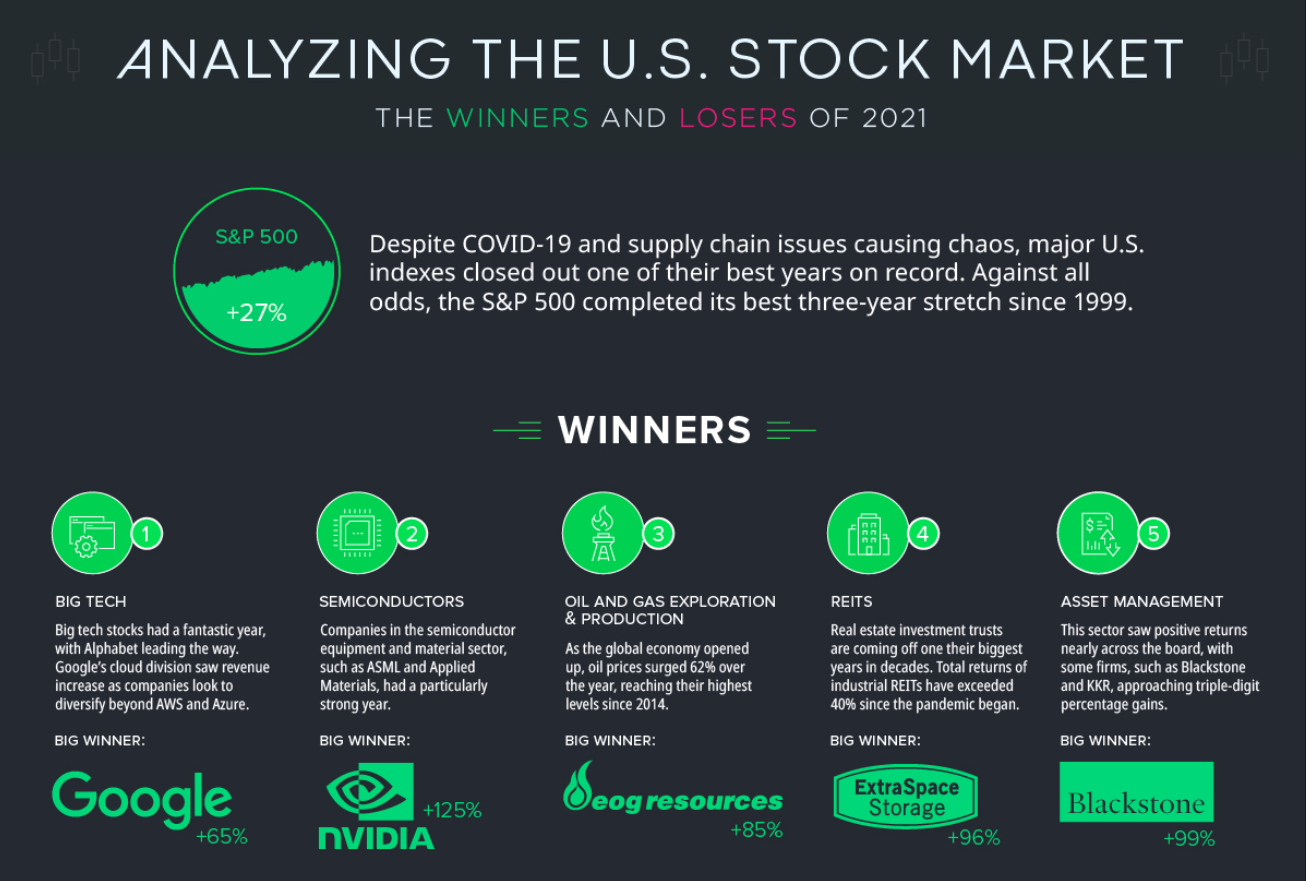It was another eventful year – and while it may not quite compare to the pandemonium experienced in 2020, it was still jam-packed with market moving events, such as:
Q3 2021 hedge fund letters, conferences and more
- The highly-anticipated rollout of COVID-19 vaccines
- Supply chain disruptions and an ongoing semiconductor shortage
- Record-setting stimulus spending and debt accumulation by governments around the world
- The emergence of new variants of concern such as Delta and Omicron
- Big political upsets and the Capitol riots
- Rising evidence of (non-transitory) inflation
Let’s take a look at which sectors thrived during the twists and turns of 2021—and which couldn’t stomach the volatility.
Winners and Losers of 2021, by Sector
Our visualization today uses an augmented screenshot of the FinViz treemap, showing the final numbers posted for major U.S.-listed companies, sorted by sector and industry.
Here are the big beneficiaries of last year, along with those that got left behind.
The Winners
-
Big Tech
Over recent years, it’s been no surprise to see Big Tech near the top of any list. In 2021, Alphabet continued its tear, soaring 65% to hit a $2 trillion market cap.
Microsoft finished up the year 51%, Apple up 34%, and even Meta Platforms (née Facebook) posted double-digit gains. Only Amazon had single-digit gains, up 2.4% in 2021.
-
Semiconductors
Who benefitted most from the ongoing semiconductor shortage? Those that design or manufacture them, of course.
Nvidia, for example, more than doubled its share price over the course of the year, with 125% growth. Other companies in the semiconductor equipment and materials space, such as ASML and Applied Materials, saw gains above 60%.
-
Oil and Gas Exploration & Production
2020 was touch-and-go for oil prices, with futures even sliding negative at one point. However, the most recent year was much kinder to those in the energy industry.
The WTI price started the year below $50 per barrel, but finished the year at $75 per barrel—a swing that makes a big difference in the economics of each barrel.
-
Real Estate Investment Trusts (REITs)
It was one of the biggest years in decades for REITs, which saw the FTSE Nareit All Equity REITs index have its best performance since 1976.
Those that know REITs are aware that returns vary by property sector, and this remains the case here. Specifically, it was industrial REITs—and especially self-storage REITs—that outperformed. Extra Space Storage, a REIT that invests in self-storage units, finished up the year 96% and is the perfect example of this.
-
Asset Management
With record-low interest rates and continued upheaval from COVID-19, it sets a perfect stage for opportunistic private equity firms.
The asset management industry as a whole did well in 2021, but specifically it was PE firms like Blackstone and KKR that took advantage, posting gains of 99% and 84% respectfully.
Honorable Mentions:
Banks, Retail Home Improvement, Building Materials, Healthcare Plans, Engineering & Construction
The Losers
-
Precious Metal Miners
Inflation took off in 2021, and a usual beneficiary of this is the precious metals sector.
However, in the last 12 months, this has not been the case. Both gold and silver finished with negative returns on the year, which hurt precious metal miners.
-
Chinese Ecommerce
Beijing has been cracking down on China’s domestic tech sector as of late, and this has had a knock-on effect on companies like Pinduoduo, Alibaba, Baidu, and JD.com, which saw a collective collapse in their share prices.
All were down double digits, but Pinduoduo—the largest agriculture-focused technology platform in China—saw the highest amount of drag, falling over 67% on the year.
-
Solar Companies
Solar installations in the U.S. are chugging along at a record pace, as expected.
However, both regulatory uncertainty and supply chain problems have hampered stock prices in the short term. That’s why companies like Sunrun, a residential solar panel company, saw a 51% dip in stock performance in 2021.
-
Internet Content and Information
Big tech continued its surge, but other tech-enabled content and information companies saw tougher years. One example of this is Zillow, which shuttered the doors on its home flipping operation after realizing losses of $500 million.
Zillow stock was down 54% on the year, and has laid off a quarter of its staff.
-
Big Credit
It was a mediocre year for the big credit card companies like Visa and Mastercard, which were both flat in terms of stock market performance. Meanwhile, PayPal fell 19%.
According to billionaire investor Chamath Palihapitiya, 2022 may not be any better. Days ago, he predicted that both Visa and Mastercard will be the biggest business failures in the coming year.
Article by Visual Capitalist














